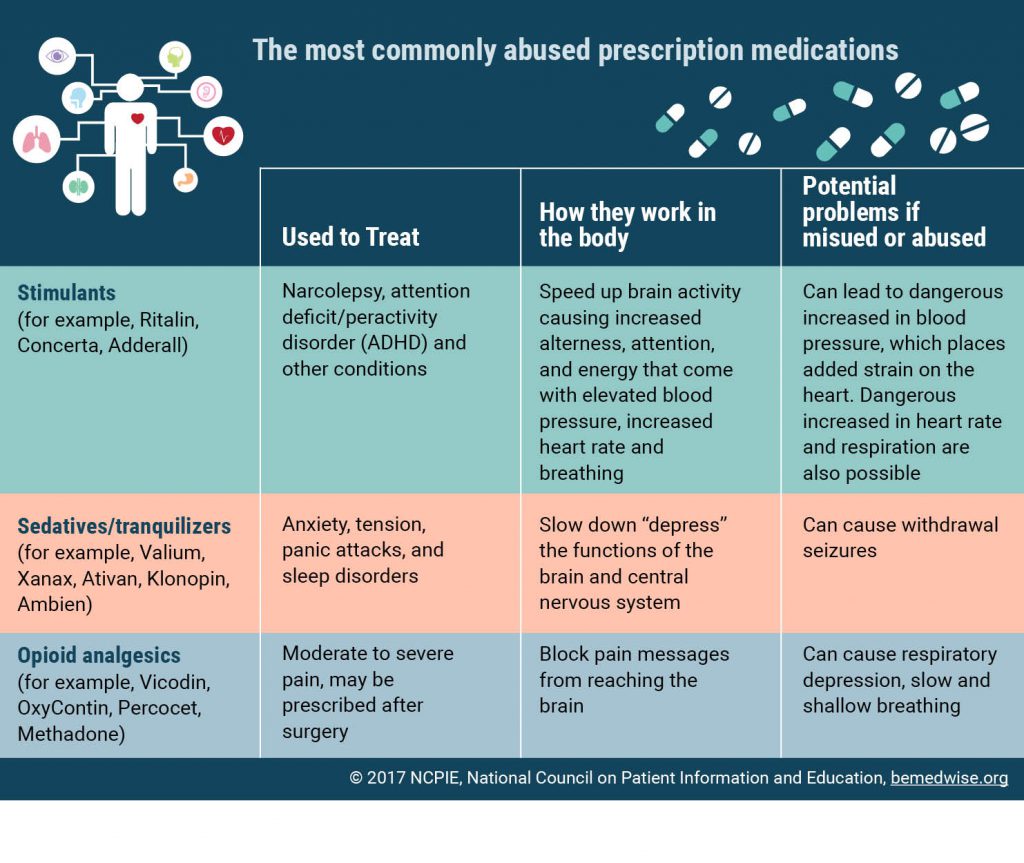1 in 4 teens report having misused or abused a prescription drug at least once in their lifetime.
Drug-Free.org
All about medicine abuse.
What is medicine abuse? It’s the use of a medication—prescription (Rx) or over-the-counter (OTC)—in a way not intended by a healthcare provider. Medicine abuse includes everything from taking a friend’s prescription painkiller for your backache to ingesting pills to get “high.”
Drug abuse takes a toll on millions of Americans every day. It’s important to understand medicine abuse is part of this national problem.
Many people, especially teens in high school and college, mistakenly believe abusing prescription and/or OTCs can be a “safe” way to get high, cope with stress or perform better at school or sports because medicines are FDA-approved and prescribed by healthcare providers.
From prescription drugs and over-the-counter medications to street drugs and alcohol, virtually any drug can be abused. While illicit drugs like heroin and cocaine are abused any time they are used, prescription drugs are abused whenever they are used in a manner other than intended, or by someone other than to whom they were prescribed.
drugabuse.gov
So, what’s the concern? Is inappropriately taking a medicine the same as drug abuse?
“Misuse” of a prescription drug is taking it to treat a medical condition but not as directed by a healthcare provider or according to the directions on the packaging.
“Abuse” is taking prescription drugs or OTCs with the sole intention of getting high. This is “drug abuse,” but using medicines—rather than illegal street drugs. Whether misused or abused, many prescription drugs—as well as some OTC medicines—can be as dangerous and addictive as “street” drugs. Taking medicines that have not been uniquely prescribed to you, and/or mixing different prescription drugs or OTCs together or with alcohol or other substances can have grave and possibly deadly consequences.
Why? If you’re taking someone else’s medication, a doctor isn’t able to examine you and select a medicine and dose for your specific needs. And, because medicines affect everyone differently, it’s possible that a medicine that works for your friend can trigger an adverse reaction in you that you weren’t aware you should be on the lookout for. For example, combining some stimulants like ADHD medications with over-the-counter cold medication can cause dangerously high blood pressure or irregular heartbeat. Combining certain medicines with alcohol can also be very dangerous. For instance, both prescription pain relievers and alcohol slow breathing. Taking too much of these together at the same time can cause someone to stop breathing.
The most commonly abused prescription medications
Although many medications can be abused, the following three classes are most commonly abused:

Some OTC medicines such as cough and cold medicines containing the cough suppressant ingredient dextromethorphan (DXM) can also be abused. Today, roughly 1 in 27 teens report abusing excessive amounts of DXM to get “high.” Read more about recognizing and preventing teen OTC cough medicine abuse at StopMedicineAbuse.org.
During a one year period ending in February 2019, an estimated 69,029 people died of a drug overdoes.
National Center for Health Statistics
Did you know it’s illegal to share your prescription medications with other people?
It is not only dangerous to take a friend or relative’s prescription medicine, it’s illegal. Intentionally sharing a prescription medicine is a felony. Illegal distribution of prescription drugs is a Federal drug violation, punishable by up to five years in prison. So it’s illegal to both give someone your prescription medicine and take a prescription medicine that is not prescribed for you.

